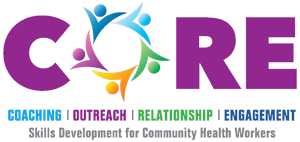Eating Healthy on the Job
Intended Audience
The intended audience for this course is workers in the construction industry.
Length
The length for this course is approximately 40 minutes depending on the individual user. Upon completion of the course, you will get a certificate of completion from the Oregon Bureau of Labor and Industries, Apprenticeship and Training Division, the Oregon Department of Transportation, Office of Civil Rights, and the Healthier Workforce Center of the Midwest at the University of Iowa College of Public Health.
Prerequisite Requirement
NA
Core Competencies for Public Health Professionals
Domain 3: Communication Skills
- 3A2. Communicates in writing and orally with linguistic and cultural proficiency (e.g., using age-appropriate materials, incorporating images).
Learning Objectives
At the end of this course, you will be able to:
- Describe how nutrition can impact workplace safety and health.
- Recognize how poor nutrition puts workers at risk for injury on the job.
- Apply strategies for healthy eating to your daily life.
Before you begin, please take the pretest. The pretest score will not be counted toward your final score.
Content
The content for this course is strategies for healthy eating on the job.
The course includes a learning module with interactivity and scenario application activities, a list of resources, and a posttest at the end of this course.
A Certificate of Completion is awarded on successful completion of this course. In order to successfully complete this course, you MUST score 70% or higher on the posttest. If you do not receive 70% on the posttest, you may review the material and re-take it.
Acknowledgements
The following organizations collaborated on the development of this course:
- The Oregon Bureau of Labor and Industries, Apprenticeship and Training Division
- Oregon Department of Transportation, Office of Civil Rights
- Healthier Workforce Center of the Midwest, University of Iowa College of Public Health
This project is supported by Intergovernmental Agreement BOLI-ODOT 2016-103 from the Oregon Bureau of Labor and Industries, Apprenticeship and Training Division and the Oregon Department of Transportation, Office of Civil Rights.
Accessibility Statement
The Midwestern Public Health Training Center (MPHTC) website has a goal of conforming to the Web Content Accessibility Guidelines 2.0 of the World Wide Web Consortium. These guidelines explain how to make web content more accessible for people with disabilities.
The MPHTC site is built using HTML and CSS code compliant with World Wide Web Consortium standards. The site displays correctly in current browsers and should also display correctly in future browsers.
While we strive to make sure our entire site is compliant, we realize that not all areas of the site will be completely accessible. If you have trouble accessing an area of our site, please contact the MPHTC webmaster at help@training-source.org for assistance.
Promoting U Through Safety and Health (PUSH): A Training for Young Workers
The goal of this course is to provide young workers (less than 25 years old) with strategies to protect themselves at work. Topics include why young workers are at risk for injuries, finding and controlling hazards, worker rights, communication, workplace violence, harassment, and discrimination, and being alert and ready for work.
Intended Audience
The intended audience for this course is anyone who is new to the workplace, particularly those under the age of 25.
Length
The length for this course is approximately 45 minutes depending on the individual user. Upon completion of the course, you will get a certificate of completion from the Healthier Workforce Center of the Midwest at the University of Iowa College of Public Health.
Prerequisite Requirement
N/A
Core Competencies for Public Health Professionals
Domain 3: Communication Skills
3A2. Communicates in writing and orally with linguistic and cultural proficiency (e.g., using age-appropriate materials, incorporating images)
3A6. Communicates information to influence behavior and improve health
3A7. Facilitates communication among individuals, group, and organizations
4A2. Describes the diversity of individuals and populations in a community
Learning Objectives
At the end of this course, you will be able to:
Describe why young workers are at greater risk for injury and illness.
Recognize hazards in the workplace, including those that are unique to young and new workers.
Apply effective prevention strategies including communication methods and workplace policies.
Before you begin, please take the pretest. The pretest score will not be counted toward your final score.
Content
The content for this course is strategies young workers can use to protect themselves at work.
The course includes learning module with interactivity and scenario application activities, a list of resources, and a posttest at the end of this course. A Certificate of Completion is awarded on successful completion of this course. In order to successfully complete this course, you MUST score 70% or higher on the posttest. If you do not receive 70% on the posttest, you may review the material and re-take it.
Acknowledgements
Funding for this training was provided by the National Institute for Occupational Safety and Health (U19OH010154).
It was created by the Oregon Healthy Workforce Center with support from:
Development Team: Diane Rohlman, PhD, Megan Parish, MPH, Diane L. Elliot, PhD
Videos: Dawn Jones of Hearts and Sparks Productions
We also thank Portland Parks and Recreation for their enthusiastic support of this project, particularly Barbara Augon, Larissa Doty, and Nancy Roth.
Course contents are solely the responsibility of the authors and do not necessarily represent the official views of NIOSH.
